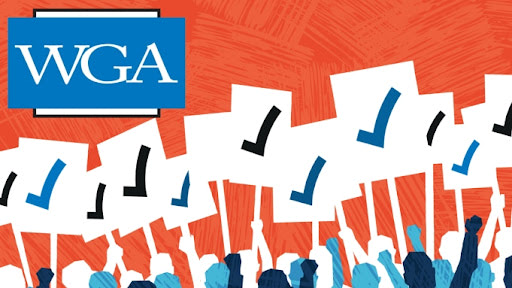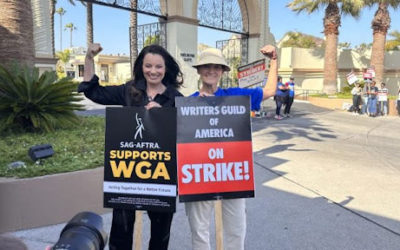Source: Deadline
The script of a given film or television episode could very well be its most important asset. Without it, a director cannot visualize how a certain scene is supposed to play out. An actor cannot develop a proper understanding of how their character is supposed to feel and behave. Dialogue can be improvised in theory, but relying too heavily on improvisation can make one come across as uncertain and unprepared. Before any real production (or even most of pre-production) can take place, there needs to be at least a single draft of a script so that the people creating a work of audiovisual media can have some comprehension of what kind of material they seek to produce. Because of all this, the screenwriter is easily one of the most essential members of the filmmaking process, as its their words that will allow the rest of the creative team to know what it is exactly that they need to bring to the table. Considering just how important the writer is when it comes to making films and television series, one would think that they would be justly compensated for their work. That’s not always the case however; in fact, there are several writers working in the industry right now that feel they are not receiving fair treatment in terms of how much they are being asked to work and how much they are being given in return. How adamant are the writers are in getting what they feel they deserve? They’re so determined that they’re willing to take to the streets and picket for their fair share, an event that could end up grinding the entirety of the film and television industries to a halt.
On Tuesday, April 11th, the Writers Guild of America (WGA), the nation’s largest union for film and television writers, opened up voting that would allow members to decide whether or not the guild as a whole would go on strike. Should the measure be approved by a majority of voters, several of the WGA’s roughly 25,000 members (around 20,000 who are part of the Los Angeles-based WGA West and about 5,000 who make up the New York City-based WGA East) will most likely stop whatever work they are currently doing and join their fellow guild members in a nationwide strike, one that will undoubtedly force nearly every film and television production that utilizes WGA-affiliated writers to come to a standstill. In an email sent to all members of the WGA, guild leaders stressed the importance of going on strike if a satisfactory agreement with the American Motion Picture and Televison Producers (AMPTP) cannot be reached, claiming that “the survival of writing as a profession is at stake in this negotiation.”
“Over the past decade, while our employers have increased their profits by tens of billions, they have embraced business practices that have slashed our compensation and residuals and undermined our working conditions,” the email reads. “We’ve met and talked with thousands of you about our bargaining agenda and heard loud and clear that this negotiation can’t be business as usual. The compensation increases and protections we’re demanding are designed to restore what has been taken away from writers.”
Having begun on Tuesday at 8:30 pm, the vote is currently expected to continue until Monday, April 17th at noon. At the moment, an overwhelming “yes” vote is being expected by many; to how great of a degree is currently uncertain, but a previous strike authorization vote in 2017 saw 96% of WGA members voting in favor of going on strike, so there is precedent that this latest vote will achieve a similar tally. Making a strike even more likely is how much the WGA is going to great lengths to ensure that those who can vote for a strike are doing so; among the most notable writings pushing for solidarity within the guild are Thomas Schnauz of “Better Call Saul” fame and Ariel Dumasare, the head writer of “The Late Show with Stephen Colbert”, all of whom are taking to social media to sway fellow WGA members to fight for a strike.
It should be noted, however, that a vote in favor of a strike will not automatically cause a strike to go into motion, as the WGA is still undergoing talks with the AMPTP for a new contract. In fact, the AMPTP actually offered WGA leadership (with Ellen Stutzman serving as chief negotiator) the opportunity to engage in talks during a week that had originally been planned to serve as time off between talks. The WGA refused to return to negotiations until Friday, April 14th, but they are nonetheless expected to resume for three more days once the WGA is able to sit back down with the AMPTP. In the meantime, various meetings among the guild have or are expected to take place to discuss the possibility of a strike and its potential ramifications.
Whether its’ in-person meetings at locations like the Sheraton Universal in Los Angeles and the United Federation of Teachers’ Shanker Hall or in the comfort of members’ homes via Zoom, most of the WGA is taking this time to communicate with one another and discuss what the best course of action is, even though most seem to be in agreement that a strike may very well be necessary. “I appreciate the outreach,” one pro-strike guild member claimed in regards to an information being scheduled for April 13th in West Los Angeles, “but I already know how I’m voting.”
So far, this sentiment seems to be shared almost universally throughout the WGA, with even the most conservative of writers starting to feel resentment of their current working conditions and agreements. “We’ve been patient, we’ve been willing to meet the studios more than halfway before,” one writer claims. “Nobody wants to see production halt, obviously, but now we need to see some action, some real increases and equity.” Nonetheless, productions could very likely come to halt if producers are not willing to give the writers their dues, something that the WGA, whether it be through simple negotiation or an industry-halting strike, is willing to fight for no matter what. “The studios need to understand that the days of lowballing need to end, they need to know this is not business as usual,” an unnamed cable showrunner has stated. “Giving our team in the room more leverage can only be a positive outcome in the short and long run.”




